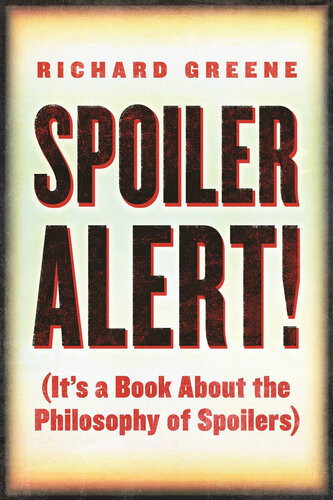Product desciption
Spoiler Alert Its A Book About The Philosophy Of Spoilers Richard Greene by Richard Greene 9780812694734, 9780812694697, 0812694732, 0812694694 instant download after payment.
Spoilers get folks upset—really upset. One thing that follows from this is that if you pick up a book that's all about spoilers, it may seriously disturb you. So anyone reading this book—or even dipping into it—does so at their peril.
Spoilers have a long history, going back to the time when some Greek theater-goer shouted "That's Oedipus's mom!" But spoilers didn't use to be so intensely despised as they are today. The new, fierce hatred of spoilers is associated with the Golden Age of television and the ubiquity of DVR/Netflix/Hulu, and the like. Today, most people have their own personal "horror story" about the time when they were subject to the most unfair, unjust, outrageous, and unforgivable spoiler.
A first definition of spoiler might be revealing any information about a work of fiction (in any form, such as a book, TV show, or movie) to someone who hasn't encountered it. But this isn't quite good enough. It wouldn't be a spoiler to say "The next Star Trek movie will include a Vulcan." Nor would it be a spoiler to say, "The story of Shawshank Redemption comes from a short story by Stephen King." There has to be something at least a bit unexpected or unpredictable about the information, and it has to be important to the content of the work. And you could perpetrate a spoiler by divulging information about something other than a work of fiction, for example details of a sports game, to someone who has tivoed the game but not yet watched it.
Timing and other matters of context may make the difference between a spoiler and a non-spoiler. It could be a spoiler to say "There's a Vulcan in the next Star Trek movie" if spoken to someone raised in North Korea and knowing absolutely nothing about Star Trek. It can also be a spoiler to say something about a movie or TV show when it's new, and not a spoiler when it has been around for some years.
This raises the distinction between "personal spoilers" and "impersonal spoilers." Personal spoilers are spoilers for some particular individual, because of their circumstances. You should never give personal spoilers (such as when someone says that they have never seen a particular movie, even though the plot is common knowledge. You can't tell them the plot).
Sometimes facts other than facts about a story can be spoilers, because they allow people to deduce something about the story. To reveal that a certain actor is not taking part in shooting the next episode may allow someone to jump to conclusions about the story. Spoilers need not be specific; they can be very vague. If you told someone there was a big surprise ending to The Sixth Sense or Fight Club, that might spoil these movies for people who haven't seen them.
You can spoil by mentioning things that are common knowledge, if someone has missed out on that knowledge ("Luke and Darth Vader are related"), but you usually can't be blamed for this. People have some obligation to keep up. This means that in general you can't be blamed for spoilers about stories that are old. "Both Romeo and Juliet are dead at the end" could be a spoiler for someone, but you can't be blamed for it. This is a rule that's often observed: many publications have regulations forbidding the release of some types of spoilers for a precisely fixed time after a movie release.
However, some spoilers never expire, either because the plot twist is so vital or the work is so significant. So, if you're talking to young kids, you probably should never say "Darth Vader is Luke's father," "Norman Bates is Mother," "Dorothy's trip to Oz was all a dream," "All the passengers on the Orient Express collaborated in the murder,"...


